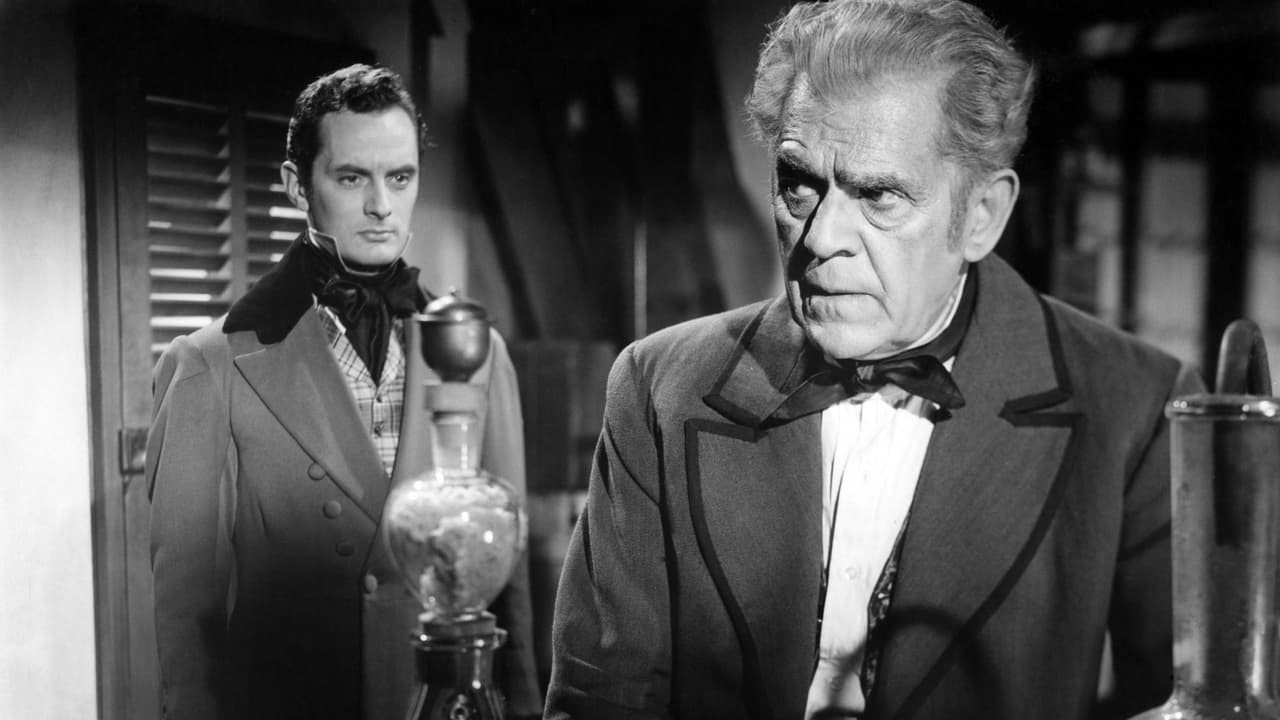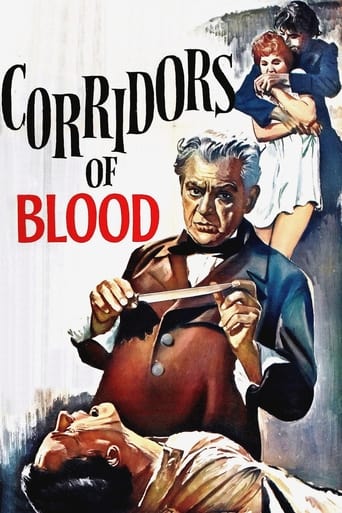

Don't Believe the Hype
... View MoreA bit overrated, but still an amazing film
... View MoreGreat example of an old-fashioned, pure-at-heart escapist event movie that doesn't pretend to be anything that it's not and has boat loads of fun being its own ludicrous self.
... View MoreOne of the worst ways to make a cult movie is to set out to make a cult movie.
... View MoreCORRIDORS of BLOOD is one of those movies that could be considered an almost forgotten masterpiece. Horror veteran Boris Karloff takes a serious lead role and is excellent. Dr. Thomas Bolton(Karloff),an aging, but still respected London surgeon, believes that surgery does not have to be painful. This is before the days of anesthesia; and Bolton, while not at the hospital or his own private charity practice, at home begins experimenting on himself trying to develop a gas based on mixtures of nitrous oxide and opium and or heroin to provide patients with painless surgery. Bolton after many unsuccessful tries, ends up losing his job...and at the same time becomes addicted to the gas. With his supplies cut off by the hospital, the doctor is desperate enough make a deal with a gang of body snatchers and falsifying death certificates in order to gain access to the chemicals he so drastically needs.Being filmed at the MGM British Studios, at lease three scenes had to be modified to please the British censors. The renown Robert Day directs this Jean Scott Rogers screenplay. A well-rounded supporting cast features: Christopher Lee, Betta St. John, Frances De Wolff, Basil Dignam, Adrienne Corri, Frances Matthews and Yvonne Warren(before she became Yvonne Romain).
... View MoreI DVR'd this movie and liked it a great deal. Boris delivers the goods as a doctor who performs surgery in a THEATER. He does not use anesthesia because it had not been invented yet. So he has to cut people while they squirm in pain. Eventually he invents an anesthesia and gets hooked on it. The more he inhales the stranger he becomes. IN once scene he laughs hysterically and cuts his arm. Yes, he FEELS NO PAIN. There is a large BLUTO looking guy who hoodwinks him into coming to his strange house of sin. At this house there are TONS of wounded people who hobble around. There is this one guy who smothers folks with pillows and sells the bodies to the local hospital. Meanwhile the BORIS KARLOFF continues to dwindle into the depths of madness. Great movie!!
... View MoreCorridors of Blood is set in 'London 1840 before the discovery of anaesthesia' where prominent surgeon Dr. Thomas Bolton (Boris Karloff) is convinced that 'operations without pain' are possible as having your leg sawn off without any anaesthesia is rather painful. Bolton feels that by experimenting with different combinations of drugs he can create a gas which will render the patient numb & not able to feel a thing as the sharp steel of the saw & knife slices through flesh... Not everyone is convinced about his ideas though & after a terrible demonstration which fails Bolton finds lots of resistance to his idea but he carries on with his experiments & becomes addicted to the drugs he creates, after he is forced to take a 'holiday' & his privilege's are revoked he has to turn to local thugs to acquire the drugs he needs...This British production sat on the self & remain unreleased for 4 years was directed Robert Day & to be fair to it it's a pretty decent film. The first thing to say is that the inappropriate & unjustly exploitative title is very misleading & that Corridors of Blood is more a historic drama than a horror film, in fact apart from some uneasy surgery scenes there is no horror in this film. The script by Jean Scott Rogers chronicles the invention of anaesthesia in an entirely fictional story, it's a fairly interesting & watchable film but I felt it was a bit dull & not much stood out for me. It has a leisurely pace, I'm not sure whether it was conceived as a horror film & I get the impression that anyone going 'blind' into this film on the back of it having Boris Karloff & Christopher Lee in it along with it's attention grabbing title will be disappointed. The character's are OK, the dialogue is alright although I didn't think that much of the overly sentimental ending. It's a decent enough film but that's it.Director Day does OK but it suffers from the limitations you think a black and white film of this vintage would. The sets are cosy enough, the period recreation looks good but it's all rather static & a bit bland. The couple of surgery scenes are pretty grim even though they're not graphic a it's more the thought of what's going on than what is actually seen. Forget about any scares as it's just not that sort of film, there's no exploitation either.Technically Corridors of Blood is fine, it's a reasonably well crafted film with good production values. The acting is good, Karloff puts in his usual commanding performance & a young up & coming actor named Christopher Lee makes for an effective villain in an early role.Corridors of Blood is a perfectly watchable film although I'm not really sure who it's meant to appeal to, for me I was hoping for a horror film because of the title & instead I got a fictional historic drama & frankly I'd rather had spent the time watching a horror film. Worth a watch but nothing that special.
... View MoreWho'd a thunk that old Boris would discover first Nitrous Oxide and then a powerful opiate based anesthetic that would turn him from respected physician to Raving Junkie? Karloff and you will realized and so will you that this was easily his best film role of the fifties and he tackles it with refined enthusiasm that makes the film a joy to watch along with it's dingy atmosphere and low key creepiness of Christopher Lee as a murderer for profit. Originally lensed in and released in England in 1958 when Lee was just becoming hot on the Hammer circuit this wasn't released in the States until some four years later when Lee was much better known and Karloff's film career was fading.It's not a fantastic film but it sure isn't dull and it's worth It just to see Karloff howling on laughing gas which makes you realize that in his whole career we never got to see him joyous and he sells it here to the max. One of my late night favorites
... View More